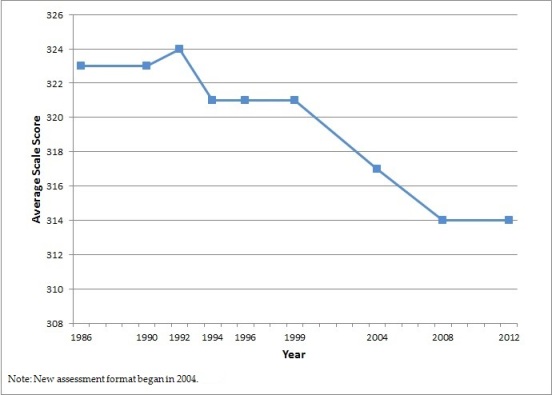… taking and successfully completing an Algebra II course, which once certified high school students’ mastery of advanced topics in algebra and solid preparation for college-level mathematics, no longer means what it once did. The credentialing integrity of Algebra II has weakened.
This is the conclusion reached by Tom Loveless in his recently released Brookings report, The Algebra Imperative: Assessing Algebra in a National and International Context.
Pushing more students to take higher level math courses has resulted in an increase in students completing Algebra II.
Percentage of 17 Year-Olds who Completed Second Year Algebra (1986-2012)
1986 —– 44%
2012 —– 76%
Look what happened to test scores over the same period.
NAEP Math, 17 Year-Olds who have Completed Second Year Algebra (1986-2012)
…
Research indicates too many unprepared students are being pushed to take advanced math.
Foundational problems begin in elementary school, and by middle school many poorly prepared students are enrolled in Algebra I. California recently abandoned its ill-advised experiment of requiring algebra for all eighth-graders after finding that aggressively pushing low achievers into higher-level middle school math courses hurt their likelihood of math success in high school.
In the end, the transition to college unmasks the charade….
Students graduate high school unprepared for college-level math.
… students are taking advanced, college-prep courses, passing them with good grades, and yet do not know the advanced subject matter signified by the titles of the courses they have taken….
The 2005 National Assessment of Educational Progress (NAEP) High School Transcript Study (HSTS) found that high school graduates in 2005 earned more mathematics credits, took higher level mathematics courses, and obtained higher grades in mathematics courses than in 1990. The report also noted that these improvements in students’ academic records were not reflected in twelfth-grade NAEP mathematics and science scores. Why are improvements in student coursetaking not reflected in academic performance, such as higher NAEP scores?
“Counterfeit” math courses hurt students and waste resources.
The researchers found that course titles often don’t mean what they say. NCES Commissioner Jack Buckley summarized the study’s main finding in an interview with Education Week, “We found that there is very little truth in labeling for high school Algebra I and Geometry courses.”[iii]
As unprepared students flow through a series of counterfeit courses, the entire curricular system is corrupted. Algebra II teachers are expected to teach mathematics to students who passed Algebra I with good grades but who, in reality, have not mastered elementary grade concepts that are fundamental to understanding algebra. Parents get false signals about how well their sons and daughters are prepared for college. Schools misallocate resources dedicated to remedial programs by assuming that students know material that they, in fact, do not know.
It is estimated that half of four-year college freshman take remedial classes.
In the end, the transition to college unmasks the charade. In California, the California State University System draws students from the top one-third of graduating seniors. In 2012, about 30% of entering freshmen taking the Entry Level Math test failed the exam and were placed in remedial math classes, despite earning a mean GPA of 3.15 in college prep high school programs. That doesn’t make sense. Good grades in tough courses, yet remediation was needed.
The problem is not confined to California. Nor is it limited to mathematics. A report from the National Center for Public Policy and Higher Education (NCPPHE) estimates that about half of all four-year college freshmen must take remedial classes….
More testing could help? Loveless suggests that having high school students take Algebra I and II computerized adaptive tests, which permit “accurate assessments at varying levels while lessening test burden from excessive questions”, could be a way to begin to restore the “credentialing integrity” of these college prep courses.
Related:

